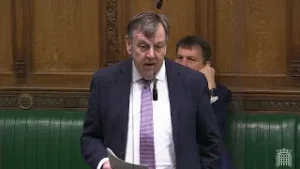Yvette Cooper The Secretary of State for the Home Department
With permission, Mr Speaker, I will make a statement about the charging of three individuals under the National Security Act 2023 that took place on 17 May, and the further action that the Government are taking to counter national security threats. I want to thank the police and the security and intelligence agencies not just for their work on the vital operations and investigations that are currently under way, but for the dedication that they show each day to defending our national security and keeping our communities safe. Their tireless work—often in the shadows, often in secret, and often in great personal danger—is indispensable, and I hope that the whole House will join me in paying tribute to their service.
On Saturday, three Iranian nationals were charged with offences under the National Security Act 2023. All three have been charged with engaging in conduct likely to assist a foreign intelligence service. Additional charges were brought in relation to engaging in conduct, including surveillance, reconnaissance and open research, with the intention to commit acts of serious violence against a person in the United Kingdom. The foreign state to which these charges relate is Iran, and those individuals are the first Iranian nationals to be charged under the National Security Act. The criminal and national security investigations in these cases are ongoing, and the police and security services have my support in their vital work. These cases must now also progress through the criminal justice system, which means that until the trial, there are limits on what we can discuss so as not to prejudice that process. However, in respect of a series of grave, wider issues, I want to update the House on the stronger action that the Government are taking to strengthen our national security, including the introduction of new powers on state threats, further action on Iran, and strengthening our border security to keep the public safe.
This is the first time there have been charges under the National Security Act linked to Iran, although the House will be aware that it comes against a backdrop of a rising number of Iran-linked operations on UK soil, where there have been repeated warnings by Ministers, the police, and our security and intelligence agencies. The director general of MI5 said in October last year that the police and MI5 had responded to 20 Iran-backed plots presenting potentially lethal threats. Let me be clear: we will not tolerate growing state-backed threats on UK soil. The Iranian regime poses an unacceptable threat to our domestic security, which cannot continue.
Following the charging decision, I can confirm that the Iranian ambassador has been summoned, and my right hon. Friend the Foreign Secretary has told the Iranian Foreign Minister in the strongest terms that we will not accept any Iranian state threat activity in the UK. As the Security Minister set out in March, we have placed the whole of the Iranian state in the enhanced tier of the foreign influence registration scheme, which is due to come into effect on 1 July. The Government have also introduced sanctions as part of efforts to systematically dismantle the criminal networks and enablers that Iran uses to carry out its work, including the Foxtrot network, which was sanctioned last month.
International co-operation is critical in challenging Iranian transnational threats, which is why we are convening ministerial counterparts from allied nations facing similar threats to discuss co-ordinated action, but we need to go further in strengthening our powers to address national security threats. The Security Minister and I have both warned of the increasing complexity of the threats we face. Threats from extremist and terrorist groups and individuals, including from Islamist extremism and far-right extremism, continue, and vigilance and action against them remain crucial.
But malign activities against us by, or on behalf of, foreign states have grown and the threats we face have become more complex and intertwined. MI5 state threats investigations have increased by nearly 50% in a year, and police investigations into state threats, led by counter-terrorism police, are up fivefold since 2018. As well as growing, those threats are becoming more interconnected, and the old boundaries between state threats, terrorists and organised criminals are being eroded. We have seen malign foreign state organisations seek to exploit any vulnerability, from criminal networks to our cyber-security and our borders, to do us harm.
In our manifesto we committed to stronger action on state-based security threats. Before entering government, the Foreign Secretary and I set out plans for the establishment of a joint unit to pursue and co-ordinate action. I can announce that the new state threats joint unit is now in place, with staff from across Whitehall driving a broader approach across Government and building new partnerships with industry and academia. Last week the Security Minister set out the recommendations of a review by the defending democracy taskforce into transnational repression—where foreign states attempt the intimidation, surveillance and harassment of UK-based individuals—including providing stronger support for those who are being targeted. This is criminal activity and will be treated as such, because everyone in this country should be able to go about their daily lives freely and without fear.
We have of course supported the National Security Act, which was rightly brought in by the previous Government, but we need to go further. That is why I commissioned Jonathan Hall KC, the independent reviewer of terrorism legislation, to examine further gaps in the national security legislation where counter-terrorism powers could be emulated and to look at proscription powers, because I have long raised concern that it is too difficult to apply existing powers to state and state-backed bodies. Today Mr Hall has published his review, and I thank him for working so swiftly and comprehensively. He has concluded that there are gaps in a series of areas, including proscribing legislation, where he identifies a series of legal difficulties in using powers that were designed to deal with terrorist groups for state and state-backed organisations, such as the Islamic Revolutionary Guard Corps.
I can tell the House that we are committed to taking forward Mr Hall’s recommendations and that we will draw up new powers, modelled on counter-terrorism powers, in a series of areas to tackle state threats. Crucially, I can tell the House that we will create a new power of proscription to cover state threats—a power that is stronger than the current National Security Act powers in allowing us to restrict the activity and operations of foreign state-backed organisations in the UK—including new criminal offences for individuals who invite support for or promote the group in question. We will not hesitate to use the power against organisations that pose a threat to UK residents, because we will not stand for foreign state organisations seeking to escalate threats on UK soil.
As was confirmed at the weekend, the three individuals who have been charged came to the UK between 2016 and 2022 by lorry and small boat. This Government have made it clear that border security is national security, which is why we are introducing new counter-terrorism powers at the border. However, let me also be clear that our border security needs to be strengthened. Those involved in organised crime, malign state actors and extremists can all exploit any vulnerabilities, so the Border Security, Asylum and Immigration Bill is introducing a wide range of counter-terrorism-style powers to pursue organised immigration crime and strengthen border investigations. We have introduced the Border Security Command, which is drawing together security operations around our border that have not been taken seriously enough before, modelled on the approach that successive Governments have taken to counter-terrorism.
As part of our existing CT capabilities, security identity and criminal record checks are carried out on everyone who applies for a visa through our immigration system, on identified clandestine entries and on those who arrive by small boat, so that immigration and counter-terrorism powers can then be used to address threats, including refusals, restrictions, tagging, heightened monitoring and immigration bail. However, I have instructed officials to review those capabilities against the state threats as well as the terrorism-related risks we face, so that we can strengthen our security response alongside the new counter-terrorism-style border powers that we are introducing. We are already reviewing our current response to criminality or threats in the asylum system, including the potential for greater use of a range of techniques and technology, as well as the existing ability to revoke or refuse asylum.
Finally, in the face of this increasing range of hybrid threats to our national security, the Prime Minister has committed to publishing a new national security strategy. The strategy, which is in development, will set out how not just our world-leading police and security and intelligence agencies, but the whole of Government and society, including businesses and communities, need to respond to these changing and complex threats.
National security is the first duty of Government, and it is the foundation of our plan for change. The threats we face are more intertwined than ever, and our response needs to adapt. Together with our international allies, we need to face down the security threats and strengthen the powers and capabilities of the police and security services, who work around the clock to investigate and disrupt those who mean us harm. Our agencies have the wholehearted support of this Government because, in a volatile and uncertain world, their efforts could not matter more. I commend this statement to the House.
John Whittingdale Conservative, Maldon
The Home Secretary may be aware of a visit I made to Iran International just a few weeks ago, during which it expressed its appreciation for the fantastic support it has received from the Metropolitan police and security services. If she has not already done so, will she or the Minister for Security visit Iran International in order to send the message that threats to its journalists and those of the BBC Persian Service are utterly unacceptable, as are threats to their families based in Iran?
Yvette Cooper The Secretary of State for the Home Department
I thank the right hon. Member for his important question. Threats to Iran International, its journalists and their family members are disgraceful and completely unacceptable. He is right to commend the work of counter-terrorism police and the security services in addressing this issue. We take the safety of anyone on UK soil immensely seriously, and no threat to the safety of any individual, and certainly any organisation or journalist, will ever be acceptable in the UK.


